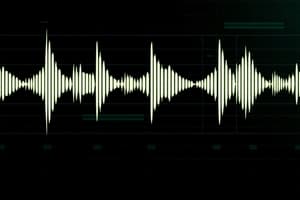Podcast
Questions and Answers
What is the minimum multiplexing bandwidth required for the 30 signals described in the text?
What is the minimum multiplexing bandwidth required for the 30 signals described in the text?
- $160 kHz$
- $188 kHz$
- $94 kHz$ (correct)
- $120 kHz$
What is the minimum transmission bandwidth required for the 30 signals described in the text?
What is the minimum transmission bandwidth required for the 30 signals described in the text?
- $120 kHz$
- $188 kHz$ (correct)
- $160 kHz$
- $94 kHz$
If a 0.7 kHz guard band is allowed between each signal and below the first signal, what is the new multiplexing bandwidth?
If a 0.7 kHz guard band is allowed between each signal and below the first signal, what is the new multiplexing bandwidth?
- $188 kHz$
- $94 kHz$
- $120 kHz$
- $100 kHz$ (correct)
What is the purpose of the local oscillator in a superheterodyne receiver?
What is the purpose of the local oscillator in a superheterodyne receiver?
What is the advantage of the superheterodyne principle over the tuned radio-frequency (TRF) receiver?
What is the advantage of the superheterodyne principle over the tuned radio-frequency (TRF) receiver?
What is the purpose of the ganged capacitors in a TRF receiver?
What is the purpose of the ganged capacitors in a TRF receiver?
In a superheterodyne receiver for AM radio, what is the purpose of the local oscillator?
In a superheterodyne receiver for AM radio, what is the purpose of the local oscillator?
If an AM radio station is broadcasting at 600 kHz and the intermediate frequency (IF) is 455 kHz, what should be the frequency of the local oscillator if it operates above the incoming frequency?
If an AM radio station is broadcasting at 600 kHz and the intermediate frequency (IF) is 455 kHz, what should be the frequency of the local oscillator if it operates above the incoming frequency?
What is the main advantage of using a superheterodyne receiver?
What is the main advantage of using a superheterodyne receiver?
What is the potential disadvantage of using a superheterodyne receiver?
What is the potential disadvantage of using a superheterodyne receiver?
In a superheterodyne receiver, what is the purpose of the mixer?
In a superheterodyne receiver, what is the purpose of the mixer?
What is the potential issue known as the 'image frequency problem' in a superheterodyne receiver?
What is the potential issue known as the 'image frequency problem' in a superheterodyne receiver?
In a superheterodyne receiver, the purpose of the local oscillator is to:
In a superheterodyne receiver, the purpose of the local oscillator is to:
In the given example, if the first local oscillator frequency is 106 MHz, what is the image frequency?
In the given example, if the first local oscillator frequency is 106 MHz, what is the image frequency?
What is the minimum intermediate frequency required to prevent image frequency problems in the 2.8-3 GHz radar band?
What is the minimum intermediate frequency required to prevent image frequency problems in the 2.8-3 GHz radar band?
In a superheterodyne receiver with two intermediate frequencies, if the first IF is 30 MHz and the second IF is 10 MHz, what is the frequency of the second local oscillator?
In a superheterodyne receiver with two intermediate frequencies, if the first IF is 30 MHz and the second IF is 10 MHz, what is the frequency of the second local oscillator?
Which of the following statements about image frequencies in superheterodyne receivers is true?
Which of the following statements about image frequencies in superheterodyne receivers is true?
In an amplitude modulation (AM) system with additive noise, which component of the received signal contains the desired message?
In an amplitude modulation (AM) system with additive noise, which component of the received signal contains the desired message?
Flashcards are hidden until you start studying




